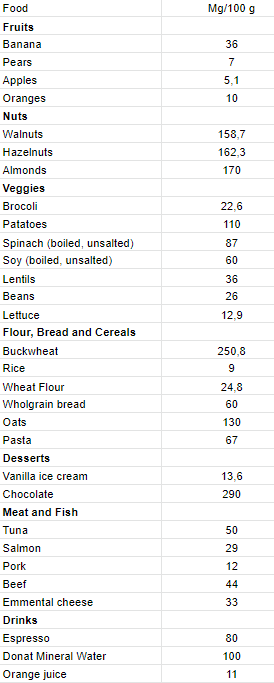If we asked you the chemical symbol for magnesium, you’d probably fire back the answer Mg, even if you were asleep in chemistry class. Almost everyone’s familiar with this vital mineral. However, few people are truly aware of just how much our health and well-being depend on magnesium. For example, did you know that magnesium is involved in over 300 biochemical processes in the body? Are you surprised? Read on!
This article will explain why magnesium in food is so important, and what its role is in the body. We’ll also share some tips on how to ensure you’re getting enough of it.

Let’s start at the beginning: what exactly is magnesium?
Magnesium is a solid, light, silver-white metal that’s one of the most commonly found elements on Earth. It’s present in all types of cells and organisms, as well as in the Earth’s crust and the sea. The correct balance is vital for all living beings, and plants depend on it for photosynthesis, i.e. the production of oxygen and energy.
Like calcium, another well-known element, magnesium belongs to the group of alkaline earth metals.
Magnesium is one of the most common minerals on Earth, and is essential for all living beings.
Magnesium is the fourth most abundant mineral in the human body and one of the most important. It plays a key role in the energy metabolism and blood pressure regulation, and is vital for strong bones, normal muscle and nerve function, healthy digestion, and a regular heartbeat.
Even so, research shows that about half of adults in North America and Europe don’t meet the recommended daily intake of magnesium. The reason often lies in the unvaried and unhealthy diets which come with our hectic lifestyles.
That’s why it’s so important to learn how to strengthen the body’s mineral reserves and eat more magnesium-rich foods.
What are the benefits of magnesium for the body?
Magnesium is a mineral that the human body needs in sufficient quantities, as it’s essential for the enzymes that regulate many biochemical reactions. On average, an adult body contains around 25 g of magnesium. Around 60% is contained in the bones, while the rest is located in the muscles and soft tissues. Only about 1% of magnesium is present in extracellular fluids such as blood, which is why the amount of magnesium in the blood is not a good indicator of our magnesium intake.
But in which processes does magnesium play an essential role?
- Obtaining energy from food. Magnesium activates enzyme reactions that are vital for the glucose metabolism. The body cannot produce energy without it. This is particularly important for athletes and anyone who is physically active. Insufficient magnesium intake can result in muscle cramps or stiffness.
- Protein formation. Magnesium helps produce proteins from amino acids, which our body needs in large quantities.
- Normal muscle function. Magnesium is extremely important for normal muscle function, which it ensures in conjunction with calcium. While calcium activates muscles in order to trigger contraction, magnesium regulates their relaxation. If magnesium is unable to effectively counteract calcium, muscle cramps may occur and muscle fibres may become more prone to tearing or stretching.
- Heartbeat regulation. Magnesium is also responsible for the most important muscle in the body – the heart. As in all other muscles, it acts as a counterbalance to calcium and ensures that the fibres relax after contraction. A magnesium deficiency can manifest itself in a rapid or irregular heartbeat, which can be extremely dangerous. Magnesium also supports cardiovascular health by relaxing the walls of blood vessels, thereby regulating blood pressure and reducing the risk of a heart attack.
- Normal nervous system function. Magnesium also plays a key role in transmitting signals between the brain and various parts of the body. It prevents excessive stimulation of nerve cells, which can cause them to deteriorate and die. This helps prevent brain damage and improves memory.
- Cell division and regeneration. Magnesium ensures the normal formation and regeneration of cells, thus helping to maintain cell health. Studies show that adequate magnesium levels may reduce the risk of developing certain diseases, including cancer.
- Electrolyte balance. Magnesium regulates the body’s electrolyte balance, which is essential for a number of chemical reactions.
- Strong bones and healthy teeth. Together with calcium, magnesium ensures normal bone and tooth structure. This ensures high bone density and prevents brittle bones.
- Blood sugar regulation. Some recent studies suggest that magnesium is particularly beneficial for patients with type 2 diabetes, as it helps cells improve their insulin sensitivity.
- Better sleep. Magnesium promotes the production of neurotransmitters (chemicals that transmit signals between nerve cells) in the brain, helping the body to relax during sleep. This means we wake up less often and enjoy better sleep.
- Normal psychological function. By helping regulate brain function and mood, magnesium reduces the risk of depression and may even reduce its symptoms, according to the latest research.

Our digestion loves magnesium too
Among the many processes in which magnesium plays an essential or highly important role, we cannot overlook digestion.
This is because muscle relaxation is crucial for both healthy digestion and bowel movements. Magnesium relaxes the muscles of the digestive tract, speeding up the rhythmic movement of the intestines, which is necessary for regular bowel movements. In this way, magnesium helps eliminate poor digestion and prevents constipation.
If constipation is already causing you problems, be sure to read the article Best Ways to Relieve Constipation.

Magnesium in food – recommended daily intake and sources
Now that you know how important magnesium is for our health, you may be wondering how much your body actually needs to keep everything running smoothly. What role does magnesium from food and drink play in this?
Your recommended daily magnesium intake depends on many factors, as the body’s need for this mineral varies depending on age, weight, sex, physical activity, alcohol consumption, and health status.
General guidelines range from 200 to 400 mg per day for women and 300 to 500 mg per day for men. The Slovenian National Portal on Food and Nutrition states that the recommended daily intake (RDI) for magnesium is around 375 mg. To illustrate: to get this amount of magnesium, you’ll need to eat a cup of oatmeal (100 g), a 180-g serving of cooked spinach, two slices of rye bread (64 g), and a cup of wild rice (30 g), followed by an espresso.
The portal also states that children under the age of 3 need 80 mg, and those under the age of 8 need 170 mg of magnesium.
Some experts even recommend consuming 6 mg per kilogram of body weight as a guideline. Since most people do not meet this requirement, it’s even more important to pay attention to the magnesium content of your diet.
While getting enough magnesium is especially important for growing children and pregnant women, the need for this mineral can also increase with intense athletic activities (like long runs, challenging bike rides, swimming, etc.), as well as health issues like stress, diarrhoea, vomiting, or diabetes.
Recommended magnesium intake depends on many factors, such as age, physical activity and medical condition.
So how can we actually meet our daily magnesium requirements? Here are some of the main sources:
- Magnesium in food. This is the healthiest way to supply the body with magnesium. Below, you’ll find a list of foods that are especially high in magnesium and are great for people who are lacking this mineral.
- Magnesium in drinks. Here we’re referring to natural mineral water enriched with key minerals and sulphates that speed up digestion and strengthen health. One such mineral water is Donat, a clinically proven remedy for improving digestion and relieving many health problems.
- Magnesium in dietary supplements. These are available in pharmacies and well-stocked food shops. Magnesium effervescent tablets or sachets are particularly popular. The latter can benefit athletes and anyone who cannot meet their essential mineral requirements through diet alone. More on this topic below.
Which foods contain magnesium?
Most of our daily magnesium needs can be covered with a healthy and balanced diet. Even minor changes to the diet can mean a significant difference in daily mineral intake and thus improve well-being. However, to achieve this, we must first answer the key question: Which foods contain magnesium?
Fortunately, this remarkable mineral is naturally present in many foods that we can readily obtain at the nearest shop. Excellent sources include nuts, pumpkin seeds, legumes (some of which have ten times more magnesium than meat!), wholegrain foods, leafy vegetables, as well as good old potatoes. Smaller amounts can also be found in fruits such as bananas and oranges, meat, milk, eggs, coffee, and tea.
In general, the richest sources of magnesium are those that contain more chlorophyll, or green pigment, such as cabbage, chard, and spinach. Experts also recommend foods rich in fibre, with vegetables generally containing more magnesium than fruit.
Along with these dietary suggestions, we must include an important reminder. When food is cooked in water, its magnesium content decreases. This is because magnesium, along with other minerals, is leached into the water. The mineral content of vegetables can also be reduced due to certain fertilisation practices. Furthermore, patients suffering from intestinal disorders or type 2 diabetes absorb magnesium less efficiently than healthy individuals, and therefore require a higher intake.

The table below will come in handy if you want to pay special attention to magnesium when planning your menu this week, as it shows how much is in 100g of various foods.
You can see that plants and legumes are the best sources of this mineral, while animal foods contain smaller amounts.Think about how you can adjust your diet to include more magnesium-rich foods.
Table of foods rich in magnesium:

Natural mineral water is an exceptional source of magnesium
You don’t have to rely on food to meet the recommended intake of magnesium. You can also get many essential minerals from water. While tap water alone can cover about a tenth of the daily requirement, you can increase this proportion by drinking natural mineral water.
An excellent example is Donat mineral water, whose unique combination of magnesium sulphate and hydrogen carbonates supports smooth functioning of the digestive tract and relieves constipation.
The key to its effectiveness lies in the combined action of sulphate ions and magnesium, which increases the volume of intestinal contents by up to five times, thus creating additional pressure on the intestinal wall and stimulating bowel movements. The effects of magnesium sulphate are also described in detail in the article Epsom Salt Against Constipation, which we highly recommend.
Drinking natural mineral water can cover your daily magnesium requirements.
We have another interesting piece of information for you. Did you know that 1 litre of Donat contains as much as 1,000 mg of magnesium? This means that you can easily meet your daily requirements by drinking just 4 decilitres a day, even if you don’t pay attention to magnesium in your diet!
Get a digital assistant to track your magnesium intake
Our fast-paced lives often cause us to forget how important it is to get enough essential nutrients, such as magnesium. Fortunately, help is at hand: the Donat Moments app. Depending on your goals, the app gives you reminders and useful tips on how to enjoy Donat.
Join more than 75,000 people who’re using Donat Moments to ensure they’re getting the right amount of magnesium!
Magnesium deficiency is a hidden enemy of your health
If you’ve been sleeping poorly lately, feeling low on energy and unable to enjoy even your favourite foods, you may be suffering from a lack of magnesium. While severe deficiencies are not very common, milder cases are much more prevalent and can still have significant negative impacts.
Magnesium deficiency can cause muscle cramps, heart rhythm disorders, loss of appetite, nervousness, and even weakened immunity. In the long term, it can increase the risk of heart disease and stroke, and can also lower the levels of calcium and potassium.
With a mild magnesium deficiency, the body can make up for some of the loss from its reserves, but a prolonged deficiency can quickly lead to the following problems:
- dizziness,
- sleepiness,
- reduced concentration,
- migraines and headaches,
- muscle cramps in the face, neck, shoulder blades, along the spine and in the stomach, thighs, and soles of the feet,
- burning sensation of the skin, tingling,
- depression,
- heart problems,
- high blood pressure.
Those most at risk of magnesium deficiency include children, pregnant women, and people who are engaged in strenuous physical activity, such as athletes. Older people are also at risk, as their ability to absorb magnesium is reduced and they excrete more magnesium through their kidneys.
Magnesium deficiency can also rapidly develop due to certain medical conditions, for example digestive disorders such as vomiting and diarrhoea. People with diabetes, thyroid problems, and those who drink excessive amounts of alcohol are also at risk.

Dietary magnesium or supplements? That is the question!
If the recommended daily intake can be met through magnesium in food or natural mineral water, then what’s the point of dietary supplements? Are they even necessary? When are they needed? And which kind of magnesium is best? We’re happy to provide answers to these questions.
Although it’s generally true that we can cover most of our magnesium needs through careful food and drink choices, there are exceptions. Sometimes our bodies may need more magnesium than we can obtain through our regular diet.
Especially during prolonged or strenuous physical activity, food can quickly prove to be an insufficient source of magnesium. In such cases, natural mineral water, effervescent tablets or powders that can be easily swallowed come to the rescue. This way, the body can be quickly supplied with a larger amount of magnesium. Whether you’ve just completed your first half marathon, returned from a gruelling hike, or had an extremely intense workout at the gym, rapid replenishment is highly recommended. In this case, magnesium in a sachet or tablet is undoubtedly the best option.
What about overdosing on magnesium?
While reading this article, you may have wondered whether it’s possible to overdose on magnesium. Can we actually consume too much of it?
The maximum intake for healthy individuals is not strictly defined, as there isn’t really a need for it. Usually, any excess magnesium is simply excreted in urine. It should also be noted that overdosing on magnesium through food is really difficult, as it would mean eating huge amounts.
However, if you’re taking magnesium supplements, do exercise caution. Very high doses of magnesium can weaken your breathing and muscles, and lower your blood pressure and heart rate. Diarrhoea and nausea are also potential side effects of a magnesium overdose. People with kidney problems should be especially careful.
Finally…
The mineral marked Mg is a key player in hundreds of processes in the body, making it essential for our health and overall well-being. Although severe magnesium deficiency is rare, a very large percentage of people rarely reach the recommended daily intake. In other words, nearly all of us would all feel much better if we ate more magnesium-rich foods. Or even easier, if we drank a few more glasses of mineral water.
Frequently asked questions
1. Why does the body need magnesium?
Magnesium is essential for hundreds of biochemical processes in the body. Among other things, it’s necessary for the production of energy from food, protein formation, normal muscle and nervous system function, maintaining a regular heartbeat, cell division and regeneration, strong bones and teeth…
2. Why is magnesium important for digestion?
Magnesium relaxes the intestinal muscles, speeding up the rhythmic movement of the gut, which ensures the elimination of waste from the body.
3. What’s the recommended daily magnesium intake?
The recommended daily intake of magnesium ranges from 200 to 400 mg per day for women, and from 300 to 500 mg per day for men.
4. What are the sources of magnesium?
We can get magnesium from food, drinks or dietary supplements. Foods that are high in magnesium include nuts, pumpkin seeds, legumes, wholegrain foods, leafy green vegetables, and potatoes. Smaller amounts can also be found in bananas, oranges, meat, milk, eggs, coffee, and tea.
5. Is Donat a good source of magnesium?
Donat natural mineral water is an excellent source of magnesium. Just 1 litre of Donat contains as much as 1,000 mg of magnesium, which means that drinking around 4 decilitres a day is enough to meet the daily requirement for this mineral.
SOURCES:
Al Alawi, Abdullah M et al. “Magnesium and Human Health: Perspectives and Research Directions.” International journal of endocrinology vol. 2018 9041694.
Tarleton, Emily K. “Factors Influencing Magnesium Consumption among Adults in the United States.” Nutrition Reviews, vol. 76, 7 (2018): 526–538.
“Magnesium.” Dietary Reference Intakes: The Essential Guide to Nutrient Requirements, The National Academies Press, 2006, Washington, DC.
“Magnesium – Health Professional Fact Sheet.” Office of Dietary Supplements, National Institutes of Health, 2 June 2022, https://ods.od.nih.gov/factsheets/Magnesium-HealthProfessional/.
“Magnesium.” The Nutrition Source, Harvard T.H. Chan School of Public Health, https://nutritionsource.hsph.harvard.edu/magnesium/.
“Magnezij.” Inštitut za nutricionistiko, https://www.prehrana.si/sestavine-zivil/minerali/magnezij.
Choose chapter:






